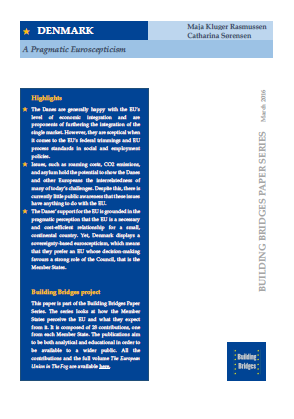
Denmark: A Pragmatic Euroscepticism
The Danes are generally happy with the EU’s level of economic integration and are proponents of furthering the integration of the single market. However, they are sceptical when it comes to the EU’s federal trimmings and EU process standards in social and employment policies.
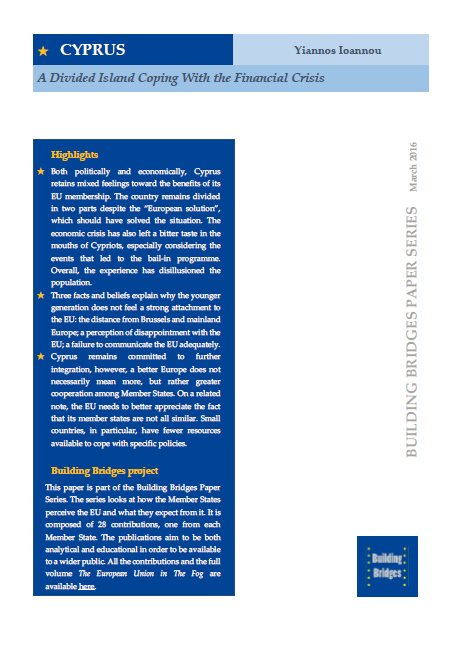
Cyprus: A Divided Island Coping with the Financial Crisis
Both politically and economically, Cyprus retains mixed feelings toward the benefits of its EU membership. The country remains divided in two parts despite the “European solution”, which should have solved the situation. The economic crisis has also left a bitter taste in the mouths of Cypriots, especially considering the events that led to the bail-in programme. Overall, the experience has disillusioned the population.
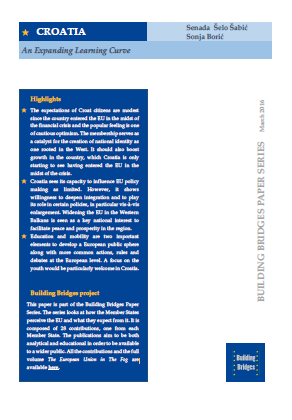
Croatia: An Expanding Learning Curve
The expectations of Croat citizens are modest since the country entered the EU in the midst of the financial crisis and the popular feeling is one of cautious optimism. The membership serves as a catalyst for the creation of national identity as one rooted in the West. It should also boost growth in the country, which Croatia is only starting to see having entered the EU in the midst of the crisis.

Bulgaria: The Spectre of a Two-Speed Europe
One of Bulgaria’s paradoxes is that 25 years after the collapse of communism and almost ten years of EU membership, it seems to be quite unhappy with the transition but rather happy with its EU membership. In this way, the EU continues to be a beacon outside rather than the reality inside the country.
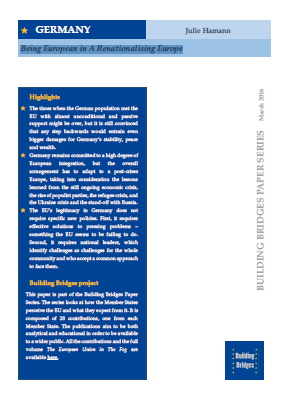
Germany: Being European in a Renationalising Europe
The times when the German population met the EU with almost unconditional and passive support might be over, but it is still convinced that any step backwards would entrain even bigger damages for Germany’s stability, peace and wealth.
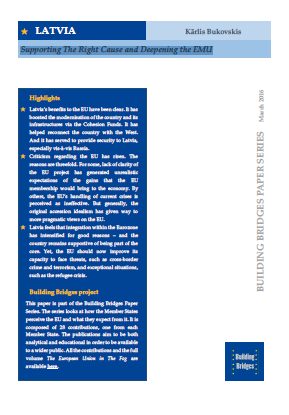
Latvia: Supporting the Right Cause and Deepening the Economic and Monetary Union
Latvia’s benefits to the EU have been clear. It has boosted the modernisation of the country and its infrastructures via the Cohesion Funds. It has helped reconnect the country with the West. And it has served to provide security to Latvia, especially vis-à-vis Russia.
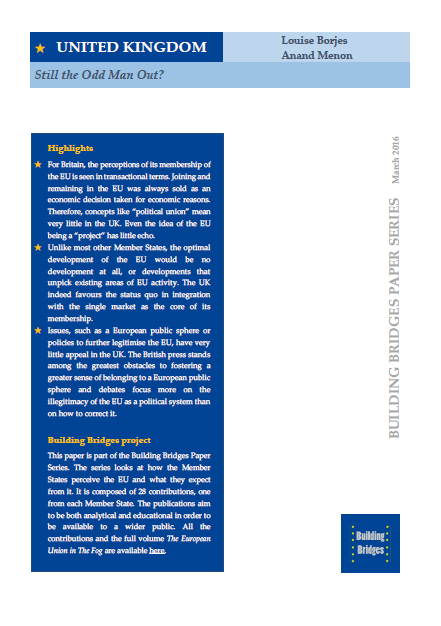
United Kingdom: Still the Odd Man Out?
For Britain, the perceptions of its membership of the EU is seen in transactional terms. Joining and remaining in the EU was always sold as an economic decision taken for economic reasons. Therefore, concepts like “political union” mean very little in the UK. Even the idea of the EU being a “project” has little echo.
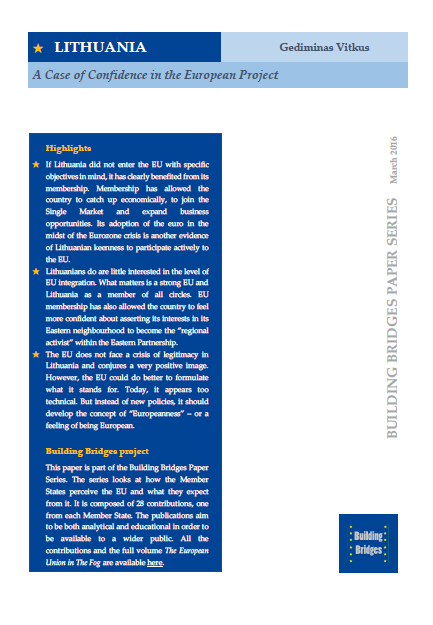
Lithuania: A Case of Confidence in the European Project
If Lithuania did not enter the EU with specific objectives in mind, it has clearly benefited from its membership. Membership has allowed the country to catch up economically, to join the Single Market and expand business opportunities. Its adoption of the euro in the midst of the Eurozone crisis is another evidence of Lithuanian keenness to participate actively to the EU.
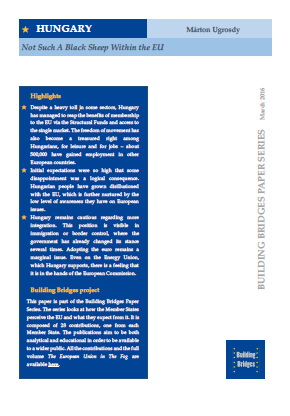
Hungary: Not Such a Black Sheep Within the EU
Despite a heavy toll in some sectors, Hungary has managed to reap the benefits of membership to the EU via the Structural Funds and access to the single market. The freedom of movement has also become a treasured right among Hungarians, for leisure and for jobs – about 500,000 have gained employment in other European countries.
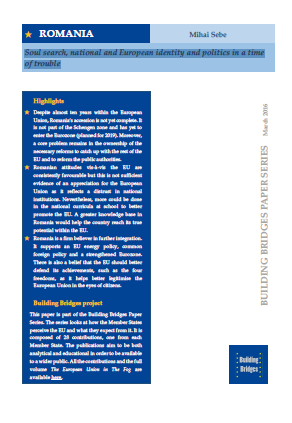
Romania: Soul Search, National and European Identity and Politics in a Time of Trouble
Despite almost ten years within the European Union, Romania’s accession is not yet complete. It is not part of the Schengen zone and has yet to enter the Eurozone (planned for 2019). Moreover, a core problem remains in the ownership of the necessary reforms to catch up with the rest of the EU and to reform the public authorities.

Sweden: Mind Rather Than Heart in EU Politics
The Swedish decision to enter the EU was not based so much on the hope of gaining something, but rather on the fear of being left out if it did not. It was probably the desire for a ‘negative safety’ that made the Swedes vote in favour of the EU as the alternative cost would probably have been too high.

Romania: Soul Search, National and European Identity and Politics in a Time of Trouble
Despite almost ten years within the European Union, Romania’s accession is not yet complete. It is not part of the Schengen zone and has yet to enter the Eurozone (planned for 2019). Moreover, a core problem remains in the ownership of the necessary reforms to catch up with the rest of the EU and to reform the public authorities.

Germany: Being European in a Renationalising Europe
The times when the German population met the EU with almost unconditional and passive support might be over, but it is still convinced that any step backwards would entrain even bigger damages for Germany’s stability, peace and wealth.
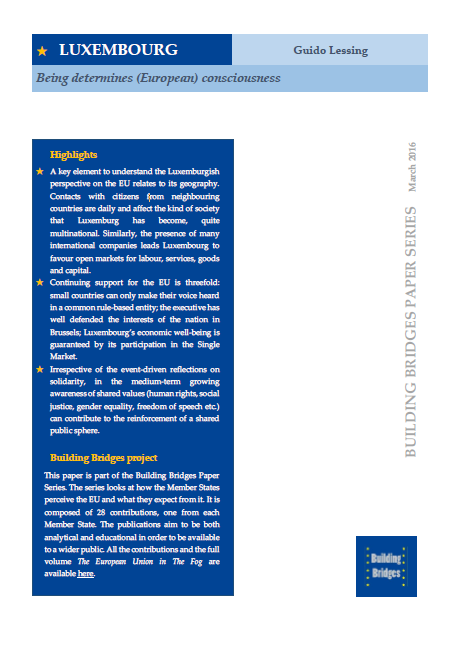
Luxembourg: Being Determines (European) Consciousness
A key element to understand the Luxembourgish perspective on the EU relates to its geography. Contacts with citizens from neighbouring countries are daily and affect the kind of society that Luxembourg has become, quite multinational. Similarly, the presence of many international companies leads Luxembourg to favour open markets for labour, services, goods and capital.
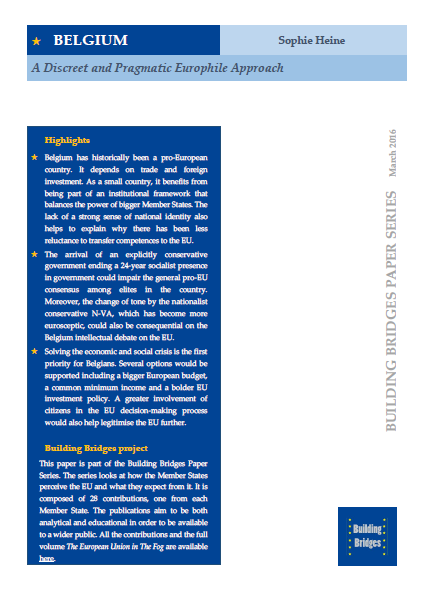
Belgium: A Discreet and Pragmatic Europhile Approach
Belgium has historically been a pro-European country. It depends on trade and foreign investment. As a small country, it benefits from being part of an institutional framework that balances the power of bigger Member States. The lack of a strong sense of national identity also helps to explain why there has been less reluctance to transfer competences to the EU.
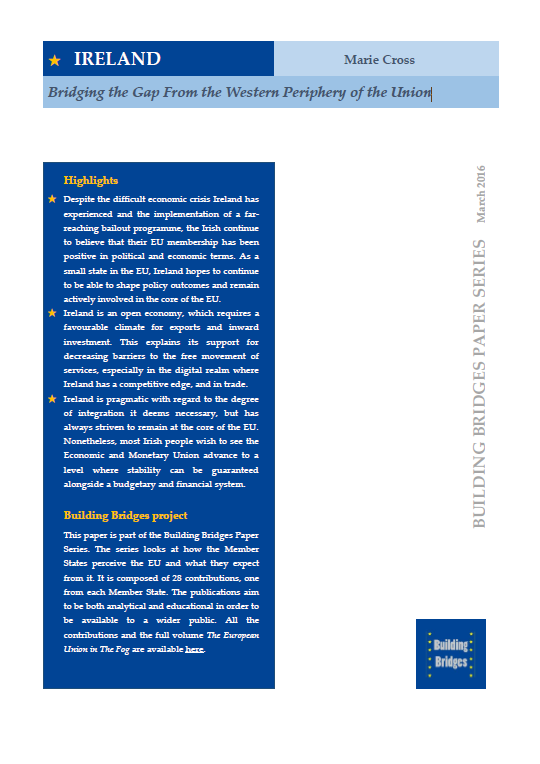
Ireland: Bridging the Gap from the Western Periphery of the Union
Despite the difficult economic crisis Ireland has experienced and the implementation of a far-reaching bailout programme, the Irish continue to believe that their EU membership has been positive in political and economic terms. As a small state in the EU, Ireland hopes to continue to be able to shape policy outcomes and remain actively involved in the core of the EU.
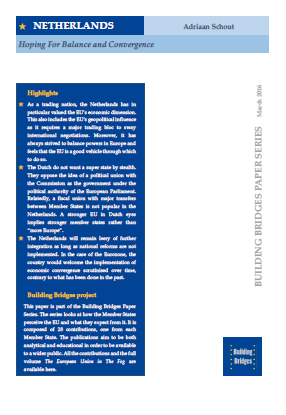
Netherlands: Hoping For Balance and Convergence
As a trading nation, the Netherlands has in particular valued the EU’s economic dimension. This also includes the EU’s geopolitical influence as it requires a major trading bloc to sway international negotiations. Moreover, it has always strived to balance powers in Europe and feels that the EU is a good vehicle through which to do so.

United Kingdom: Still the Odd Man Out?
For Britain, the perceptions of its membership of the EU is seen in transactional terms. Joining and remaining in the EU was always sold as an economic decision taken for economic reasons. Therefore, concepts like “political union” mean very little in the UK. Even the idea of the EU being a “project” has little echo.

Cyprus: A Divided Island Coping with the Financial Crisis
Both politically and economically, Cyprus retains mixed feelings toward the benefits of its EU membership. The country remains divided in two parts despite the “European solution”, which should have solved the situation. The economic crisis has also left a bitter taste in the mouths of Cypriots, especially considering the events that led to the bail-in programme. Overall, the experience has disillusioned the population.
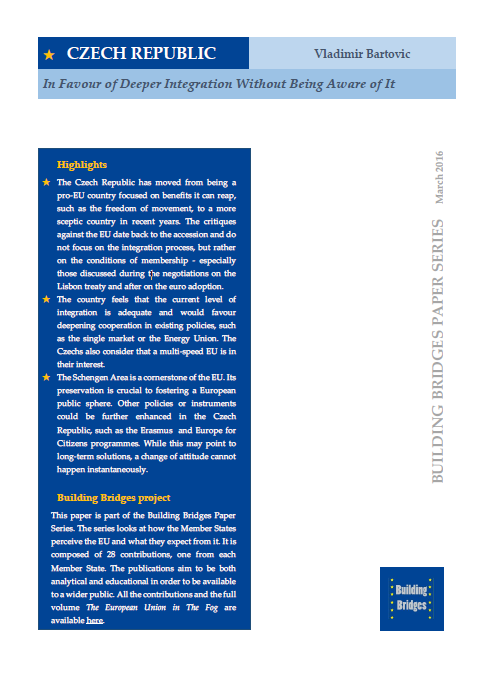
Czech Republic: In Favour of Deeper Integration Without Being Aware of It
The Czech Republic has moved from being a pro-EU country focused on benefits it can reap, such as the freedom of movement, to a more sceptic country in recent years. The critiques against the EU date back to the accession and do not focus on the integration process, but rather on the conditions of membership - especially those discussed during the negotiations on the Lisbon treaty and after on the euro adoption.
Support independent French research
Ifri, a foundation recognized as being of public utility, relies largely on private donors – companies and individuals – to guarantee its sustainability and intellectual independence. Through their funding, donors help maintain the Institute's position among the world's leading think tanks. By benefiting from an internationally recognized network and expertise, donors refine their understanding of geopolitical risk and its consequences on global politics and the economy. In 2024, Ifri will support more than 70 French and foreign companies and organizations.









